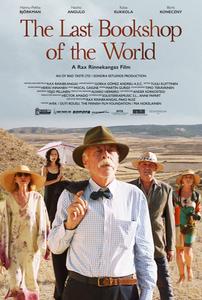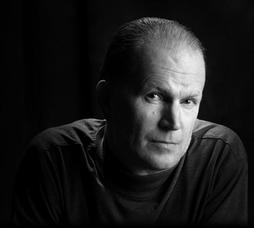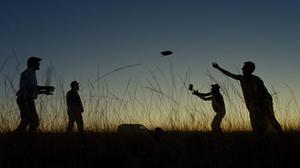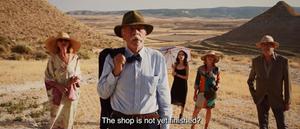 Almost everyone who opens a new bookstore talks about realizing a lifelong dream. But what if the dream of opening a bookshop actually was a dream? I thought about this while watching The Last Bookshop of the World (La Última Librería del Mundo). Written and directed by Finnish filmmaker Rax Rinnekangas, the film chronicles a literary odyssey by four European friends (three men, one woman), each speaking a different language (French, Finnish, German, Spanish). They are packed into a book-filled van, traversing a barren landscape (the Basque desert region) to an isolated destination where they plan to fulfill their bookshop dream.
Almost everyone who opens a new bookstore talks about realizing a lifelong dream. But what if the dream of opening a bookshop actually was a dream? I thought about this while watching The Last Bookshop of the World (La Última Librería del Mundo). Written and directed by Finnish filmmaker Rax Rinnekangas, the film chronicles a literary odyssey by four European friends (three men, one woman), each speaking a different language (French, Finnish, German, Spanish). They are packed into a book-filled van, traversing a barren landscape (the Basque desert region) to an isolated destination where they plan to fulfill their bookshop dream.
Is it a documentary? A work of fiction? In an interview last year, Rinnekangas, who is also a novelist and photographer, observed that we now live in a world where fiction and reality have become so indistinguishable he calls his work "fictionmentaries."
The Last Bookshop of the World found me as if it had emerged from the mists of a dream, too, since it seems to be available only through Kanopy, a digital film service for libraries and public universities, or Tubi.

|
|
| Ray Rinnekangas | |
But it found me nevertheless, and I accepted the invitation to join this seemingly crazy desert quest (the film references Mad Max as well as Don Quixote). As they travel, the four book pilgrims discuss, at length, the state of the world (endangered) and literature (also endangered). Theirs is not so much a conversation as a kind of voice-over quartet performance. They rarely address one another--they're speaking four different languages, after all--but they do create a literary soundtrack of words and ideas, connected by musical interludes. As a viewer, I was invited along for the ride, the bookish introspection, and the dream of a last bookshop by these contemplative voices:
 We were four people from four different cultures and a selection of quality books from my bookseller friend's collection. My friend said to me: Bookshops are facing huge problems in all countries--as the entertainment industry displaces quality literature. Some universities are even planning to do away with printed books. My friend also said: Take some remaining quality books and invite some of your literary friends take the books into a desert, out of the reach if industrial termites. This was my friend's wish.
We were four people from four different cultures and a selection of quality books from my bookseller friend's collection. My friend said to me: Bookshops are facing huge problems in all countries--as the entertainment industry displaces quality literature. Some universities are even planning to do away with printed books. My friend also said: Take some remaining quality books and invite some of your literary friends take the books into a desert, out of the reach if industrial termites. This was my friend's wish.
Our job was to design a shop floor plan in a place where quality books would be safer than in cities where horrible termites gnawed away their space.
We drove nights and days. The sun shaped us like Homer's texts and read us. The night caressed us like Amin Maalouf's sentences. We began to recall other texts too...
This was our conversation on the way to the unknown where we were to find a location for our bookshop.
My bookseller friend loved classic literature: Pushkin, Gogol, Balzac. He loved the WORD, which those ever-shifting, wonderful, mystical living beings called Letters form. Like Italo Calvino, my friends believed that the WORD only knows itself, and no other way of knowing the world is possible for it. With this power the WORD joins the visible to the invisible, the absent to the desired, like a fragile temporary bridge stretched across the void.
Every word written from the heart holds a Mystery. The reader reveals it by building a whole from the sentences recognized by the consciousness. A book is a Family of mysteries. Booksellers are grandparents who love all their family members. That is why they can tell customers about the contents of the books. Booksellers who can't do this are not grandparents. They are just traders.
The journey had proved the value of the book. And that we were like fictional characters from books. This knowledge alone placed us close to our destination.
Coordinates, direction of light source, and relation to landscape. This was our destination. The foundation of Culture--the last bookshop in the world would be safe in just this kind of place. But what is Culture in the end? Is it educational wisdom. Or spiritual wisdom? Who was the sage who wrote that to arrive is just the beginning. Is this where we must now design a bookshop?
When they at last find their mysterious destination, the four friends each drive a stake into the sand and begin stringing a ribbon to form the outline of their dream bookshop.
We wanted a traditional shop with a single counter, shelves for different languages, two reading areas, and a chapel-like atmosphere.
If only customers would find the shop, they would also remember the book's original identity. A book is a printed product, but above all else, it is a Family of Ideas and Mysteries.

My friend the bookseller had said that if this was true,
the building materials would arrive within a month.
The stock--about 7,000 volumes--would come before that.
We would have time to study new thinkers
before the building work began.
There would be much more understanding in the world,
at least in this shop and with regards to literature,
if this was indeed true.
A sweet dream, is it not?

